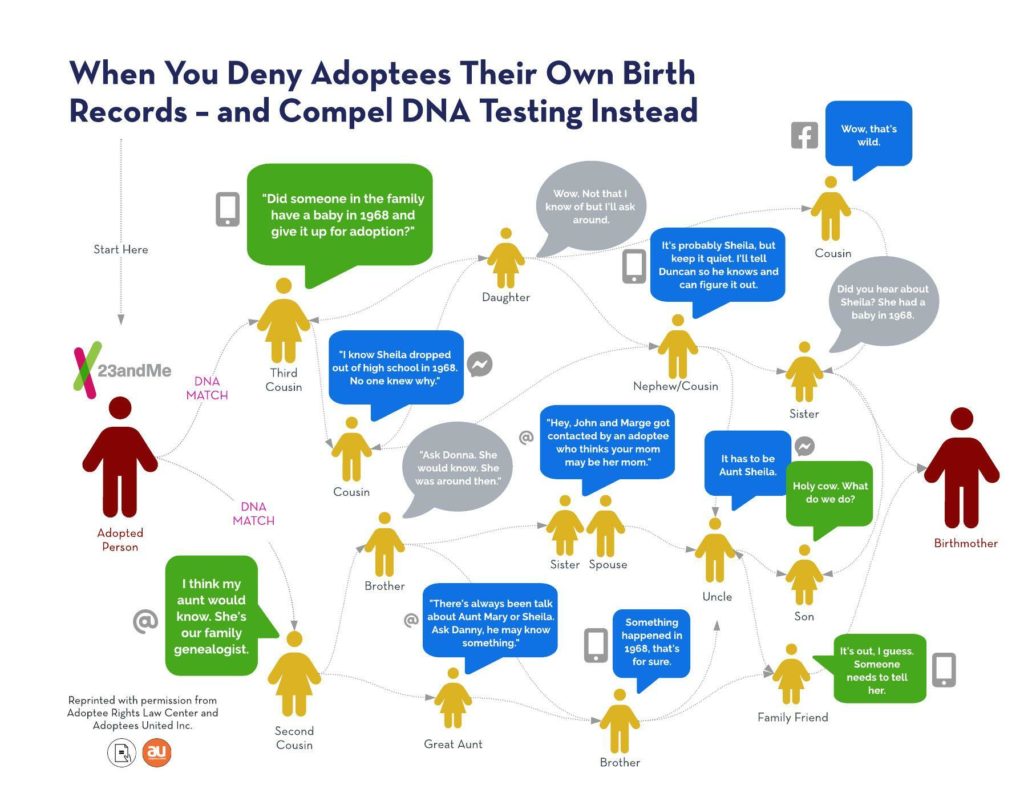An overview of Vermont House bill 629, including what it does, what it doesn’t do, and how it will work once enacted.
What does H629 do?
Vermont H629 restores a right that all adopted people in Vermont and the United States once had: the right as an adult to possess your own original birth certificate. This aligns with the following states in the New England region: Connecticut, Maine, Massachusetts, New Hampshire, New York, and Rhode Island.
What is an original birth certificate and how is it different from other birth certificates?
An original birth certificate, often shortened to “OBC,” is a government-issued vital record that contains the basic facts of a registrant’s birth, including the date of birth, the city or county of birth, and the name of any acknowledged birthparents (the “registrant” is the person whose birth is being “registered.”) Nearly every person born in the United States in the last 100 years has an original birth certificate on file with a state or local vital records office. Adopted people, however, may have two birth certificates: 1) the original with the actual facts of birth; and 2) the amended record that lists the adoptive person as if born to the adoptive parents. After an adoption, the original birth certificate may have been sealed and made unavailable to everyone, including the adoptee. H629 restores the right at age 18 for adult adopted people to request and obtain their own original birth certificate.
Are original birth certificates always sealed after an adoption?
No. When an adoption is finalized, the adoptive parents and the adopted person (if over age 14) may request that no new birth certificate be issued.
Who decides whether an amended birth certificate is created after an adoption?
In Vermont, as in many states, the court, the adoptive parents, and the adopted person if the person is over a certain age (e.g., 14) may request that no new birth certificate be issued after an adoption. A birthparent has no control over the issuance of a new amended birth certificate and the sealing of the original record.
What happens if a birthparent relinquishes a child for adoption but the adoption is never finalized?
If a birthparent relinquishes a child for adoption but the child is not adopted, the original birth certificate is not sealed and it always remains available to the registrant upon request.
How old does the adopted person need to be to request a copy of his or her own original birth certificate under H629?
Eighteen. The adopted person must be an adult to request his or her own original birth certificate. This is the same as the other states in this region.
Who else can get a copy of the original birth certificate?
Under H629, an adopted person who is at least 18 years of age and that person’s descendants may request and obtain the original birth certificate. The adopted person must be deceased for his or her descendants to request the record. In addition, birthparents named on the record already have a current right to obtain the original birth certificate upon request. Under H629, no one else can obtain a copy of the record unless they do so through court proceedings.
Does this mean that agency records and court records will also be released to the adopted person?
No. H629 is about a single document: the adopted person’s own original birth certificate. It is the only document released to the adopted person, so long as the adoptee is at least 18 years of age. If a birthparent files a contact preference form under H629, that completed form, or the information on it, would also be released to the adopted person.
What is a contact preference form and what does it do?
A contact preference form provides birth parents the opportunity to register any preference or desire for contact, if any, between the adopted person and the parent. The form, which can be filed with the Vermont Adoption Registry and made available to the adopted person upon request, allows the birthparent to communicate whether the parent would:
(A) prefer to be contacted by the adoptee.
(B) prefer to be contacted by the adoptee only through an intermediary.
(C) prefer not to be contacted by the adoptee at this time.
Will H629 lead to unwanted contact between adopted people and their birth parents?
H629 is specifically drafted to reduce unwanted contact. In fact, continuing to restrict the birth records of adopted people only creates an incentive to turn to far more public approaches to finding information, such as participation in DNA registries, inquiries on social media, and the use of other tools that are easily available to adopted people and their descendants. The chart below illustrates what that reality—of a “head-in-the-sand” secrecy approach to an adopted person’s original birth certificate— looks like.

H629 provides that the adopted person will receive “any evidence of the adoption previously filed with the State Registrar.” What does that mean?
This clause is in a number of states (and often in many states that similarly address this issue—e.g., New York and Alabama). It refers only to documents a filed with the Vermont Department of Health (VDH) after an adoption and is intended to include the Report of Adoption that VDH uses to create any new amended birth certificate (if a new birth certificate is requested by adoptive parents). The Report of Adoption is the key document that links adoptive information to the original birth certificate so that an amended birth certificate can be created. Nearly all of the information on a Report of Adoption is about the adopted child and adoptive parents. Only the name(s) of any birthparent(s) already listed on the original birth certificate is provided—and no other info—so it does not provide additional information about birthparents that is not already available on a released OBC.
The Report of Adoption is completed partly by adoptive parents (or their attorneys) and partly by the court clerk. Note: as the law provides, the Report of Adoption includes a checkbox for adoptive parents to use to request that no new birth certificate be issued.
How did the committee hearings on H629 deal with opposing views?
There was very little opposition to H629 during the eight separate committee hearings on the bill. Opposition generally speculated about concerns in releasing a birthparent’s name if that birthparent did not want their name released decades after the birth and relinquishment. In response, the House Judiciary Committee added the contact preference form to address this concern. In the Senate, to address any further specific concerns, the committee amended the bill to provide that:
A contact preference form shall include space where the parent may include information that the parent feels is important for the adoptee to know.
These provisions together recognize current best practices in releasing an adopted person’s own birth record to the adopted person at age of majority, with the ability of a birthparent to provide necessary and confidential communications to the adopted person, such as important medical or genetic information and/or additional context about a birthparent’s desire to be contacted or not to be contacted.
Do birthparents support this bill?
Yes, overwhelmingly. A survey conducted by the Vermont Commission on Women this year found that birth parents overwhelmingly support adopted people’s unrestricted right to access their own original birth records. Comments from birthparents on the survey include:
“Everyone deserves to know the truth of their birth. The people that brought them into the world. Their genetic history. Their family. Their name at birth. As a birth mother I was never promised anonymity. I do not need nor want to be “protected” from my child. Everyone deserves the truth, especially their own truths!” – birthparent respondent
These results are consistent with similar surveys and input from birthparents across the country. In addition, multiple national organizations support the approach of H629, including Concerned United Birthparents, the National Council on Adoption and Permanency, the North American Council on Adoptable Children, Adoptees United Inc., the Academy of Adoption and Assisted Reproduction Attorneys, and the American Adoption Congress. It also has the support of the Vermont Department of Children and Families.
Does this make pre-adoption original birth certificates publicly available?
No. H629 continues to preserve the confidentiality of pre-adoption birth records and will keep the records from being released to the public. Only a birth parent or an adopted person (or the adopted person’s descendants if an adopted person is deceased), may request and receive the original birth certificate.
